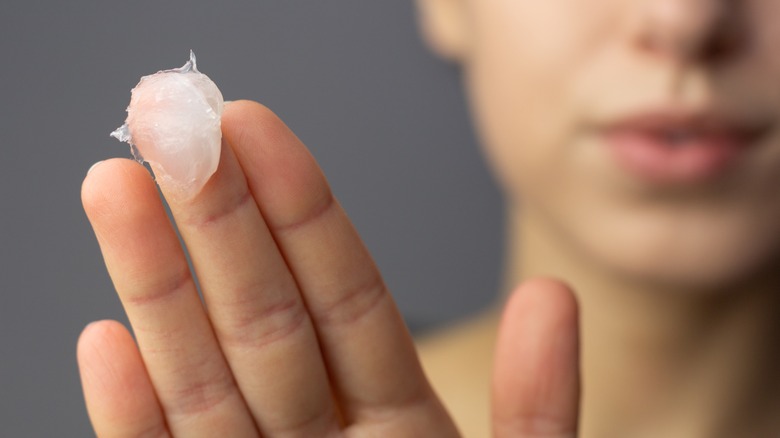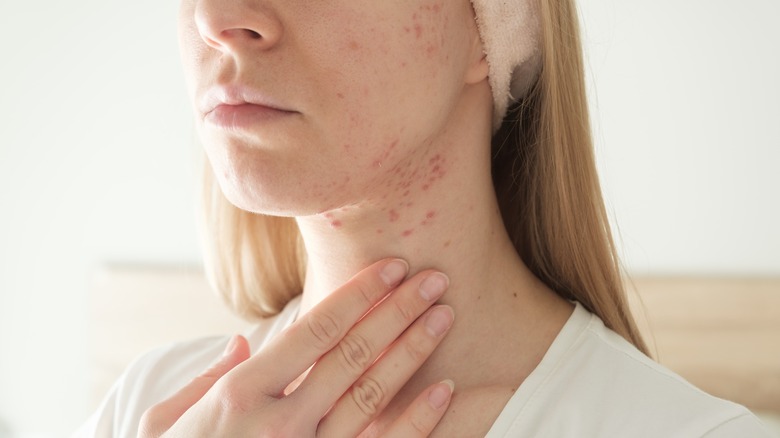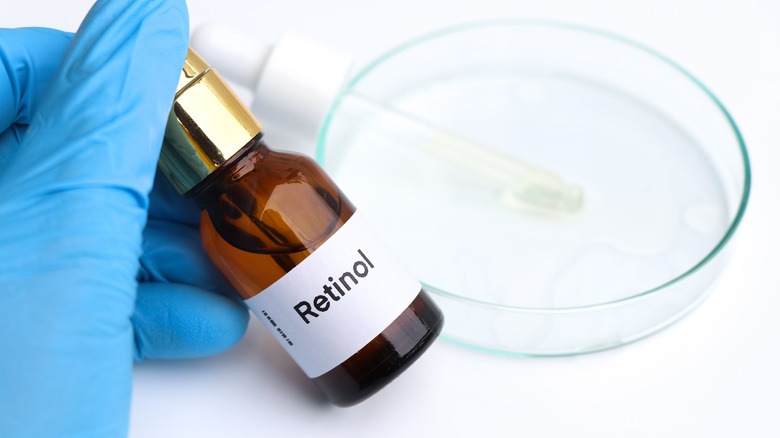Why You Should Think Twice Before Trying Face Slugging (Especially If You Have Acne)
We may receive a commission on purchases made from links.
TikTok is a vast world of beauty and skincare tips. Slugging, which has gone viral on the app, has roots in South Korea. But what exactly is slugging, and how can it help your skincare? Dr. Alexis Parcells told Elle that slugging takes an approach "of slathering on a heavy-duty occlusive like petroleum jelly as the last step of a nighttime routine." By definition, an occlusive is thick and hydrating. It works by creating a barrier that protects the skin. Parcells notes that due to the slimy appearance petroleum jelly gives the skin, the technique was coined "slugging."
Despite its peculiar name, slugging has an array of benefits. It hydrates, softens the skin, and creates a plump, glowy appearance. Slugging makes your other skin care products work at their highest potential because the technique allows them to penetrate your skin deeply. Likewise, slugging is exceptionally affordable; petroleum jelly is less than $10 and is widely available. In an article for Glamour, Rachel Nussbaum wrote about her experience slugging. She said, "The difference in my skin was night and day." Nussbaum went on to add, "My face has never been so soft."
However, before you try slugging, you should be aware that it has some pitfalls, especially if you have acne or oily-prone skin.
Slugging can be detrimental to acne-prone skin
Experts note that individuals suffering from severely dry skin will benefit the most from slugging. Occlusives on their own do not moisturize the skin. However, when combined with moisturizers, slugging retains hydration. While some experts recommend slugging for everyone, including those with acne or oily-prone skin dealing with dryness, others disagree. Dermatologist Avnee Shah, M.D., explained to Allure, "People with acne tend to have sebum, bacteria, and dirt in their pores, and unless you can be 100 percent sure it's completely gone when you slug, you're trapping all of that stuff into your pores by putting a really thick occlusive right on top."
Dermatologist Sheilagh Maguiness had a similar sentiment. She told Elle, "Individuals with active acne breakouts or blackheads should probably avoid this technique and opt instead for treatment with ingredients aimed at fighting acne, such as salicylic acid, benzoyl peroxide, and topical retinoids." If you already have oily skin, experts state that your skin won't benefit from making it even greasier with an occlusive.
Dermatologist Michelle Henry, M.D., noted to Real Simple that if a product in your skincare routine is already causing skin issues, an occlusive can worsen its effects and clog your pores.
You should avoid certain ingredients when slugging
To slug efficiently and prevent breakouts, experts recommend you thoroughly clean your face to ensure it's free of makeup and other products. After applying your moisturizers for the night, apply a small amount of petroleum jelly all over your face 30 minutes before going to sleep. If you're looking for an alternative to petroleum, CeraVe Healing Ointment and Aquaphor are among the best moisturizers for slugging your face. However, experts warn to avoid products with specific ingredients when slugging. Dr. Alexis Parcells told Elle that individuals should forgo using hydroxy acids, beta hydroxy acids, and retinoids for slugging.
Esthetician Ali Tobia explained to Real Simple, "Slugging is going to lock in whatever product you put on before it, so you have to be careful about combining an occlusive layer on top of a particularly active ingredient, like retinoids, because that can often cause irritation." Dermatologist Orit Markowitz, M.D., told Ipsy that retinoids combined with slugging could worsen skin peeling or flakiness. But other experts, like dermatologist Corey L. Hartman (via Martha Stewart), say it's okay to try using both of them together unless problems arise.
A non-skin-related drawback to consider about slugging with petroleum jelly is that it can ruin fabrics. Moreover, petroleum jelly is not eco-friendly because it is a fossil fuel-based product.


